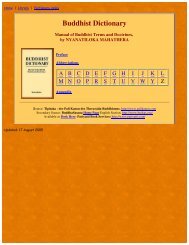Night and Morning with Bhikkhu Tissa
Night and Morning with Bhikkhu Tissa
Night and Morning with Bhikkhu Tissa
- No tags were found...
Create successful ePaper yourself
Turn your PDF publications into a flip-book with our unique Google optimized e-Paper software.
<strong>Bhikkhu</strong> <strong>Tissa</strong>: And true compassion or sympathy depends on the mind behind the action. Therefore weshould purify our intentions, for our own benefit <strong>and</strong> the benefit of others.Gene: Even the highest ideals require preparation <strong>and</strong> practical efforts, don’t they?<strong>Bhikkhu</strong> <strong>Tissa</strong>: Certainly. The Noble Eightfold Path that leads to deliverance is a practical <strong>and</strong> realisticpath. Consider the next factor on the list: right speech. We live <strong>with</strong> other people. Simply to get along insociety we must speak <strong>with</strong> care. And for our own betterment, for our own religious progress, we cannotneglect right speech, because speech, like intention, is a kind of action which will affect us for good or for ill.Gene: Right speech basically means not telling lies, doesn’t it?<strong>Bhikkhu</strong> <strong>Tissa</strong>: It means that <strong>and</strong> more than that. Specifically, it means abstaining from false speech, fromsl<strong>and</strong>erous speech, from sharp, malicious speech, <strong>and</strong> from vain, foolish talk or babble. A follower of theDhamma speaks the truth <strong>and</strong> avoids all kinds of lies <strong>and</strong> deceit. He or she is a truthful person whose wordcan be counted on.Gene: Truthfulness certainly is a good thing here <strong>and</strong> now, for society <strong>and</strong> the world, let alone forattaining enlightenment. An honest person is really a blessing to others.<strong>Bhikkhu</strong> <strong>Tissa</strong>: Right speech also means not indulging in sl<strong>and</strong>er or malicious talk. It means beingdiscreet. We should not speak words that cause strife. We should instead be glad to promote harmony <strong>and</strong>friendliness between people. In addition, we must abstain from malicious, vindictive speech. Sharp words arepainful to hear. Right speech is speech that is gentle, considerate, polite, agreeable. This is what we like tohear; it’s what we should speak to others, too.Gene: These are high st<strong>and</strong>ards! Now, what was it you said about foolish talk?<strong>Bhikkhu</strong> <strong>Tissa</strong>: To practice right speech is also to abstain from idle, nonsensical, foolish talk.Gene (laughing): In other words, most of everybody’s talk!<strong>Bhikkhu</strong> <strong>Tissa</strong>: Be that as it may, we do seem to spend a lot of time talking about trivial, silly things, don’twe?Gene: I do, anyway. And I hear a lot of that, too. I suppose it’s better to say something meaningful or tokeep silent.<strong>Bhikkhu</strong> <strong>Tissa</strong>: The Buddha says that one should speak at the right time, truly, talking about what isuseful, about the Dhamma. One’s speech has effects on others <strong>and</strong> on oneself. Therefore one should speakcarefully, thoughtfully, moderately, sensibly—not just blurt out the notion of the moment.Gene: Oh, I’ve got a long way to go, venerable sir. Often I say whatever is in my mind <strong>with</strong>out thinkingabout it or considering the consequences. And people are sensitive about how they are spoken to.<strong>Bhikkhu</strong> <strong>Tissa</strong>: If we make an effort to control our speech, we not only improve our relationships <strong>with</strong>other people, we also lighten our minds <strong>and</strong> give worthy thoughts a chance to grow. Like our intentions, whatwe say matters. If we govern our speech, not lying or sl<strong>and</strong>ering or abusing anybody or talking foolishly, <strong>and</strong>if instead we speak sensibly <strong>and</strong> kindly, then we will be acting properly—doing good in the world <strong>and</strong>weakening the defilements that cause suffering.Gene: It’s surprising how down to earth the Dhamma is. Maybe I had been expecting sublime,otherworldly teachings.<strong>Bhikkhu</strong> <strong>Tissa</strong>: The Dhamma is both sublime <strong>and</strong> down to earth. The Buddha teaches the practical thingswe should do to live honorably <strong>and</strong> to reach the highest. Now, right action is the next factor of the path.Gene: Excuse me, venerable sir, but aren’t intentions <strong>and</strong> speech kinds of action? Isn’t this what you’vebeen saying?<strong>Bhikkhu</strong> <strong>Tissa</strong>: Yes, indeed. I see you’ve been listening. Good! Right intention refers to volitional activitiesof the mind. Right speech refers to what we do through our speech, our activities of language. Now, the factorof right action concerns that which everyone can recognize as action; namely, activities of the body. In thesimplest terms, right action means abstaining from killing, abstaining from stealing, <strong>and</strong> abstaining frommisconduct in sensual desires.18
















